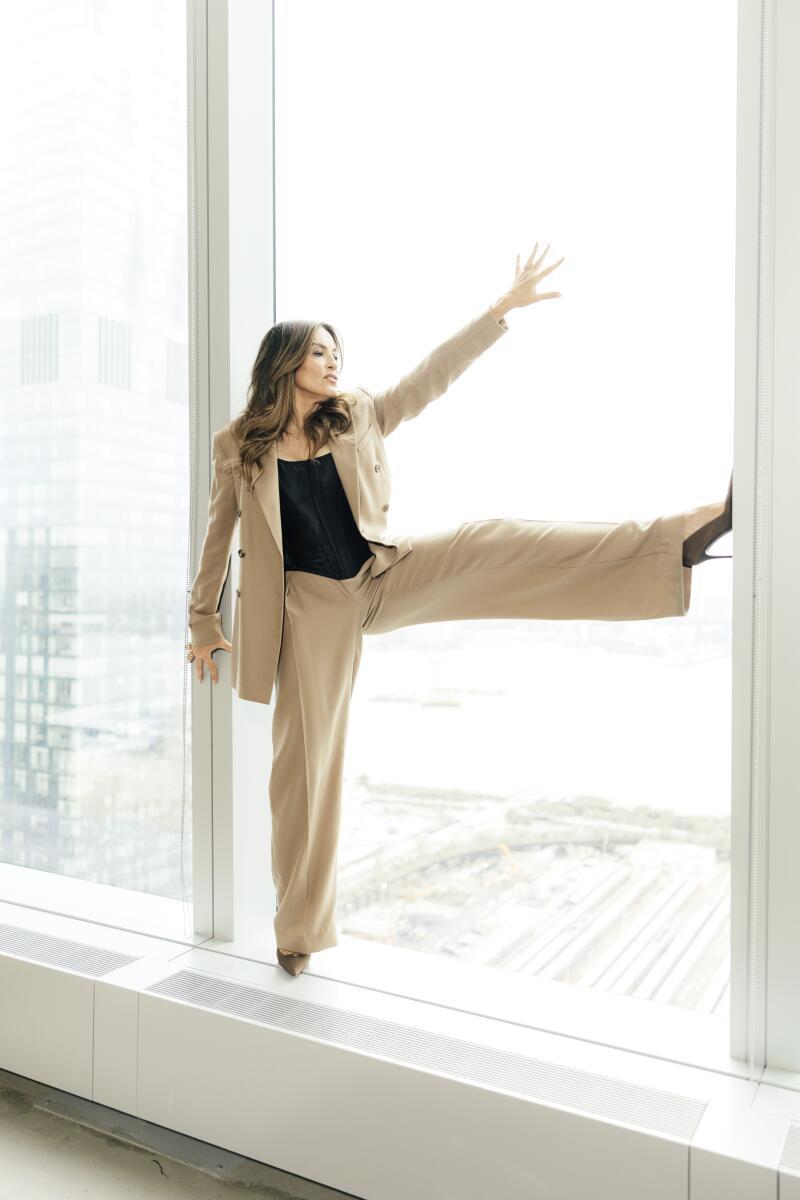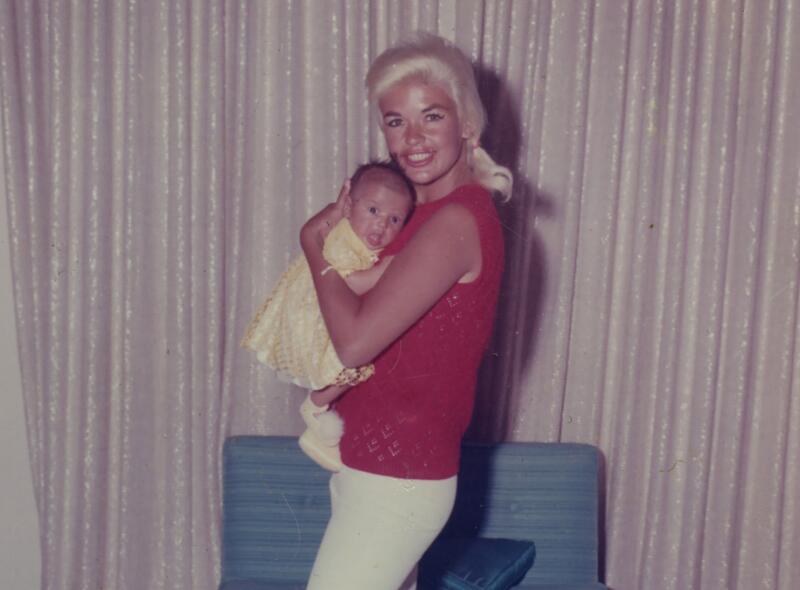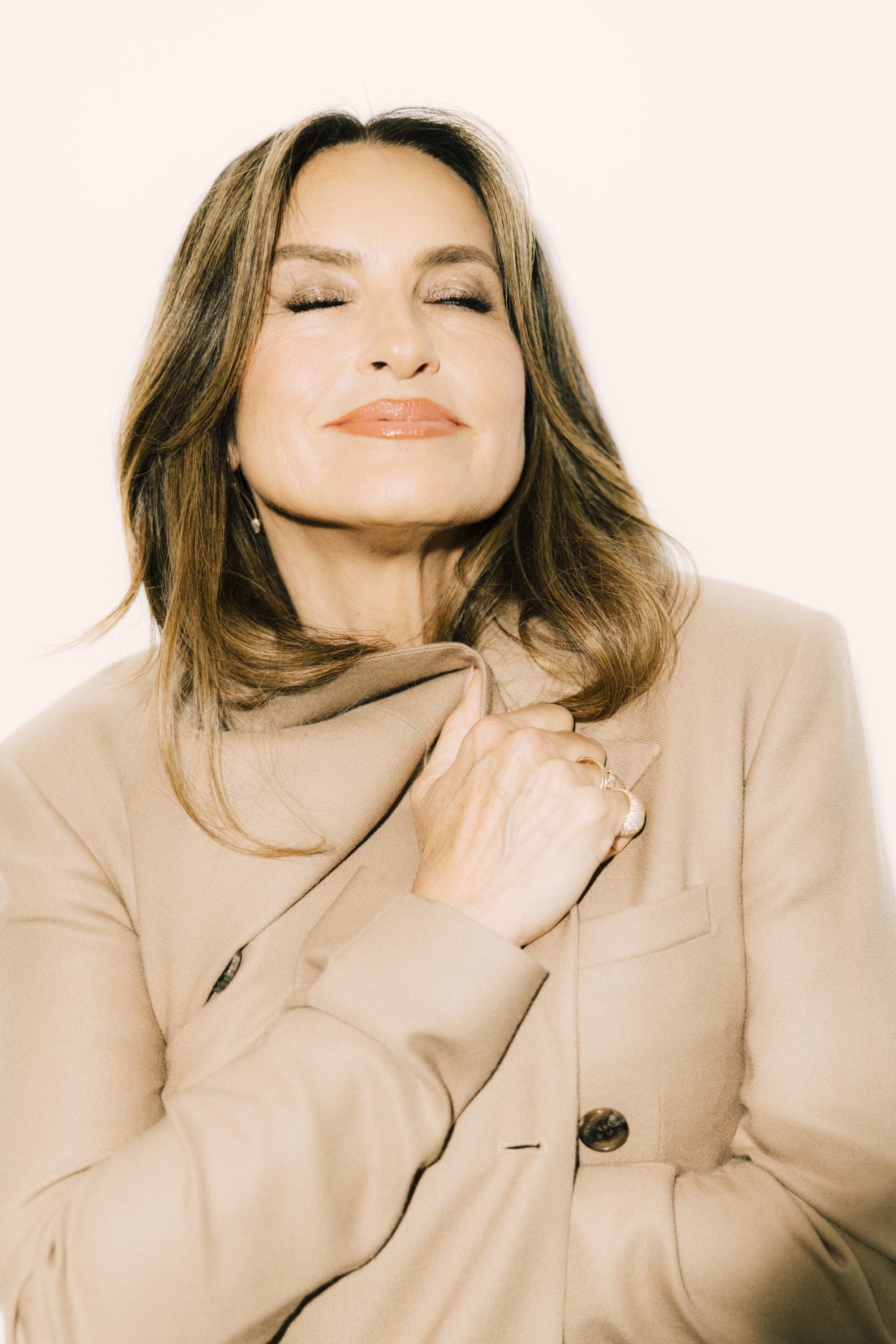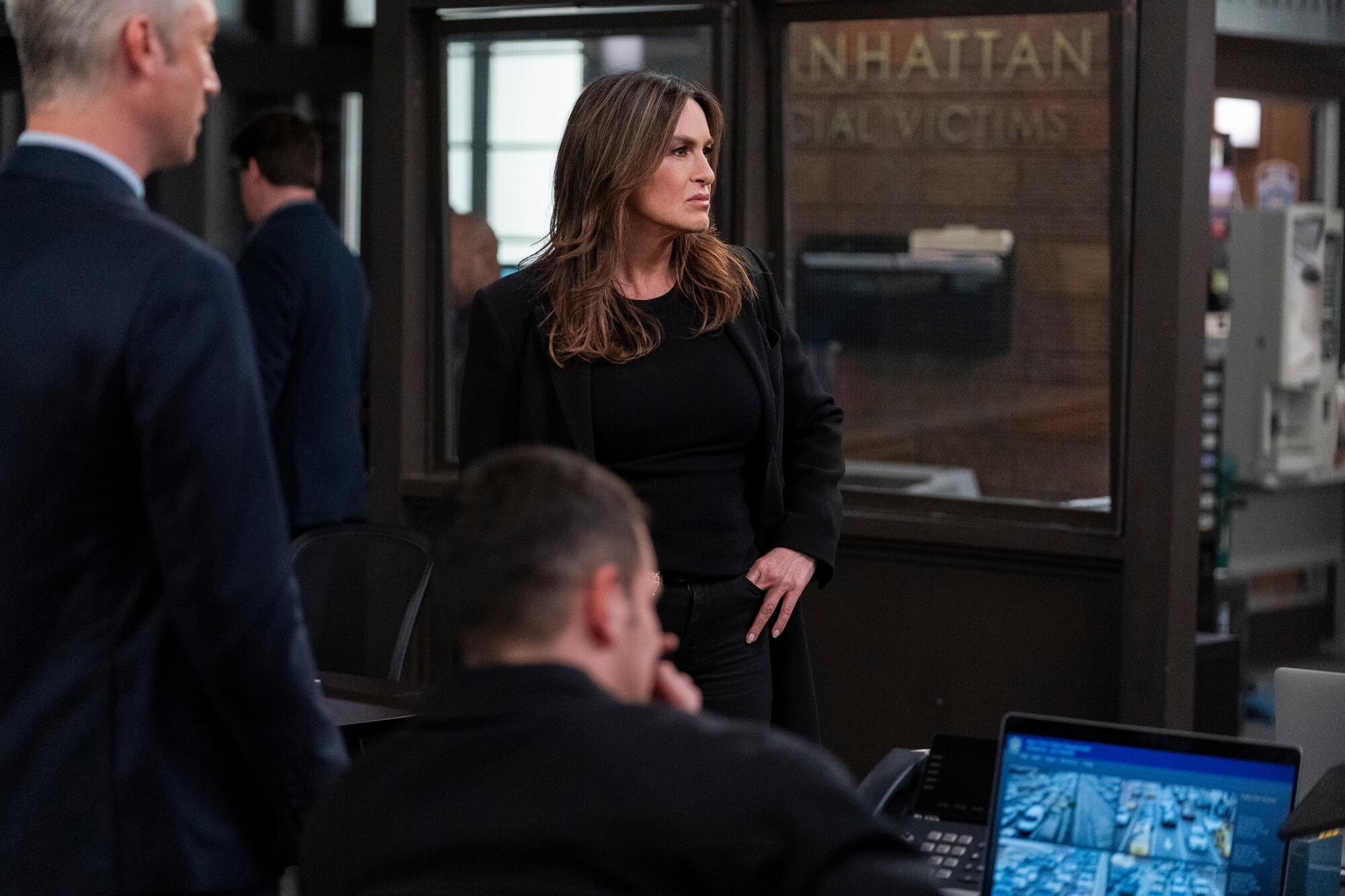“See the pink roses?” Mariska Hargitay says as she shuffles outside her home.
We’re on a video call, and when asked whether she feels the presence of her late mother Jayne Mansfield any more vividly since directing the documentary that explores her life and legacy, Hargitay swings her laptop around to give me a peek at the lush greenery of her New York home. Hargitay points to blooms a shade of pink that her mother — who famously lived in the Pink Palace, a Mediterranean-style L.A. mansion — would surely appreciate.
“I call it my Snow White balcony. I sit here and squirrels and butterflies and birds come up,” she says. “I was talking to somebody this morning, my friend, who told me the most beautiful analogy for the movie. And as she said, ‘Your mother would be so proud of you,’ these roses, right at that moment — a whole bloom fell off. It can’t be a coincidence. It’s just not.”
The “Law & Order: Special Victims Unit” actor also mentions visiting a spa recently and noticing the robes were by the Mansfield brand. “Crazy stuff is happening all the time to me … She’s with me in a new way. I’ve never felt her presence more.”
“Oh, look at this! You want to cry?” Hargitay jolts up, this time lugging the laptop into an en suite bathroom. “This was a whole scene. It’s not in the movie — I wanted it to be. But there are my mother’s sinks.” She pans down to show double sinks that feature a cherub motif.
“I just redid this bathroom because my brother, when they were tearing down the pink house, he got the sinks,” she says. “He gave them to me. I just ripped out our whole bathroom and had them put in with that pink marble. I’m living with her now, with pink roses and her sinks and my pink quartz hearts. She’s with me now.”
Mariska Hargitay in HBO’s “My Mom Jayne,” when she visits the storage unit filled with her mother’s belongings. “Why now? Because I was finally ready … I had so much internal work to do.”
(HBO)
It can all be felt in “My Mom Jayne,” the emotional and revealing documentary about Mansfield, an actor who epitomized the blond bombshell archetype of the 1950s, that premieres at 8 p.m. Friday on HBO and Max.
Hargitay was 3 years old and asleep in the back seat of a car with two of her siblings when their vehicle collided with a truck in 1967, killing Mansfield, who was born Vera Jayne Palmer. In Hargitay’s debut as a documentary director — a role she sometimes juggled while portraying Capt. Olivia Benson on NBC’s long-running crime procedural — she confronts and heals her complicated relationship with a mother she barely knew. As part of the journey, Hargitay reveals a family secret she’s been keeping for more than 30 years: Her biological father is not Mickey Hargitay, the man who raised her, but rather Nelson Sardelli, a former Las Vegas entertainer.
From her home, wearing a pastel blue hoodie that said “New York or Nowhere,” Hargitay discussed what it was like unpacking her mother’s story. Here are edited excerpts of the conversation.
How did you come to the decision that you wanted to share this story and this journey as a documentary rather than as a book? And why now?
I think I’m a better filmmaker than writer. I’m very passionate about documentaries. It’s a very visceral way of grokking a story for me, and I’ve had such powerful experiences with them. One of the things that was so important to me in this was to have everyone’s own words in the story because it’s their story as much as it is mine. It just felt like the most authentic way to approach the storytelling.
Why now? Because I was finally ready. Over the years, there’ve been so many times when various people asked me if I was going to do a doc about my mom, especially after my first one, “I Am Evidence” [the 2017 documentary Hargitay produced about sexual assault survivors whose rape kits went untested for years]. I don’t know if you know this, but I was obsessed with “Hamilton”; I saw it probably 27 times. One night, somebody said, “Oh, I’m friends with Ron Chernow [the author whose biography of Alexander Hamilton served as the inspiration for the musical] and I would love you to meet him.” We went to this dinner, and Ron and I ended up alone in a corner talking because he had seen “I Am Evidence.” He said, “Why haven’t you done a documentary, Mariska, about your mother? I think you should do a documentary.” I said to him, “Well, Ron, I don’t think I could. Everyone’s dead.” He said to me, without irony, “I think I could help you with that.”
In this moment, I realized who I was talking to — this historian, this titan of books. [He was] one of the people who just gently urged me, eased me off the the cliff. But I had so much internal work to do. I had to really shore myself up and and heal myself to make sure that I could come at it in an open, curious and objective way. It was during the pandemic that I was out in my house in Long Island, and I just had time to sit and think and go through things that I hadn’t [before]. I’d found boxes of letters that I’d received from people over the years while I was on “SVU” that I actually couldn’t even take in. If it was a letter, and it started with, “I knew your mother…,” “I knew Jayne Mansfield…,” I’d sort of go, “Ahhhh,” and put it in a box — literally, put it in a box. This is a story of opening boxes, physically and metaphorically.


Mariska Hargitay is reconnecting with her late mother in “My Mom Jayne”: “Crazy stuff is happening all the time to me. … She’s with me in a new way. I’ve never felt her presence more.” (Victoria Will / For The Times)
You were in the early years of your career when you found out this secret about your father. What do you remember about that period, trying to navigate this career while maybe feeling disconnected or untethered to an identity?
It was so disorienting. If I think about it, I can feel it in my body. It felt like the melting of my identity. It felt like I didn’t have footing anymore to stand on. The one thing that I did identify with — being my father’s daughter — was erased. And on top of it, the layers of it being secret, I couldn’t even process. I was so alone in it — because of shame, because of loyalty; I didn’t want to betray him. I remember it being the moment that I became an adult. Obviously, your life is irrevocably changed when we lose that connection with mother, as mother is everything to a child. But also because so much of it was at a time of being pre-verbal, I had all these feelings in me that I couldn’t process, couldn’t metabolize, couldn’t speak about. I was just this child of locked-in pain.
One thing I didn’t say in the movie that I wish I did, which is such a beautiful metaphor — when I left Sabin’s [Sabin Gray operated the Jayne Mansfield Fan Club and alluded to the secret during a meeting with Hargitay] and I went up to see my dad, my father was literally building me a house. How about that for a metaphor? I walked in and I was hysterically crying. He’s like, “What’s the matter?” I said, “Why didn’t you tell me? You lied to me! How could you lie to me?” To see this superhero, strong man, my mentor, my everything be undone and to see him go into such extraordinary denial that even me, as a 25-year-old, went, “Oh, I can handle this. He’s in too much pain. I don’t want to hurt him” — that was the moment that I remember going, “I’ll shoulder this myself. I can handle it.”



Hargitay, who was 3 years old when Mansfield was killed in a car crash, confronts and heals her complicated relationship with a mother she barely knew: “The process of making this film has been so extraordinary to me and totally reframed the narrative for me,” she says. (Walter Fischer / HBO, HBO, courtesy of Hargitay family / HBO)
Something that fascinated me as I entered adulthood was how curious I became about my parents as I became the age they were when they had me. You talk about feeling motherly about your mom now and giving her grace. Tell me more about that.
I think that as little girls, we all want our parents to be this certain way. For me, I wanted a normal mom that stayed home and baked cookies and didn’t run around in heels, in a bikini. I was like, “Why can’t you be normal?” So not understanding and having that myopic view or wish now, being 61 — I have three children, I have a career, I have a foundation, I have a husband. There is so much to manage, and it is hard to do it all with grace and elegance and love. I don’t know how I do it sometimes, other than I have a lot of help and an amazing husband. I got married at 40. I had my first child at 42. I was cooked; I was an adult. I had learned so much. I had so much life experience.
As I say in the film, she [Mansfield] was a baby. She was 16 years old when she got pregnant, and I will never know the story of how she got pregnant. But what she had to navigate alone with a child — I’ll tell you this, if I was pregnant and living in Dallas, Texas, I don’t know that I would have gone to L.A. by myself. I wanted to go to New York for 10 years before I left, and the reason I left is because I had a job. And this girl got in the car with her 3-year-old [Hargitay’s sister, Jayne Marie Mansfield] and said, “We’re going to California.” And the husband said, “I’m out.” But she said, “I’m doing this.” I look at her a little bit like a superhero and go, “I don’t think I could have done that.” The process of making this film has been so extraordinary to me and totally reframed the narrative for me. I was wrong to go into this film feeling one way about Nelson and thinking he abandoned me, he left my mother, he knew she was pregnant. And after all of that, to be left with: He did the right thing. He made the ultimate sacrifice for me.
How did you talk about this experience and this journey with your own kids?
First of all, they watched the whole journey. They also watched me go from being hazy — like, they’d say, “Who’s Nelson?” I’d be like, “Well, he’s like family. He’s like a second father.” And they’re like, “What do you mean?” But it was quite extraordinary for them, I think, to see this journey and to see their mother go, “Hey, guys, there are a lot of secrets in my life. I don’t want you to have secrets.” I felt like I deserved to know the truth, and I felt very betrayed finding out at 25 that my life, this person I wanted to emulate, was not my biological father. Now that also has changed because now I go, “It doesn’t matter, and nothing can change the fact that Mickey Hargitay is my father.” But I wanted my children to know that I don’t want secrets to hold them back.

“The process of making this film has been so extraordinary to me and totally reframed the narrative for me,” Mariska Hargitay says.
(Victoria Will / For The Times)
There’s the moment where you speak with your mother’s press secretary, Raymond “Rusty” Strait. He had written a book that revealed the truth about your father. You ask him whether he thought it was his story to tell, and he said yes. What was that experience like for you?
It was a very difficult interview compared to the rest of the film. I felt a lot of feelings, a lot of anger. I wanted to protect her [Mansfield] from him because he did not protect her. He said that he loved her, then right after she died, he wrote this book [“The Tragic Secret Life of Jayne Mansfield”]. Those were two very difficult things for me to reconcile still. What’s hard for me is that there are many things in the book that are not true that I know for a fact. I think if you’re going to write a biography about somebody, do your work. That [interview] was very painful to me because I never really got the response I was hoping for. It’s my job to give people the benefit of the doubt and to try to understand, and that’s what I did. But he betrayed my mother and he betrayed my family.
Yet the beauty of this is that even though it was in the world, somehow the story was protected and I got to tell it. That is extraordinary. I can’t believe that this was written in a book and that I found out when I was 25; I met him [Nelson] when I was 30. All the people — his family that knew, my sisters that knew, my friends that knew, Jayne Marie and Tony — my older sister and my younger brother — and it still never got out. And to me, that is divine intervention.
I was very concerned when I saw the crane hauling your mother’s piano into your Manhattan home. What’s it been like to have that piano in your possession?
It was the happiest day of of my life. It felt like I was reclaiming something. I was actually getting a piece of my mother back. Then there was another part of me that was like, “Who did I marry? What kind of awesome human being did I sign up for? I can’t even comprehend that I was first in line when God was handing out the husbands.”
Then I’m like, “You guys, this cannot be good, just on a physics level.” I kept saying, “Marish. Marish. People do this all the time. This is not their first barbecue.” I’ve never been on edge that much, but it was absolutely glorious.
Do you think you’ll see your mother again?
When I go to heaven? Assuming I get in?
Wherever.
Yes. I didn’t put this in the movie, and my editor wanted to kill me because I told him too late — you never know when memories come. I had this beautiful dream. I never dreamt about her, except one time. I was still living in my house that my dad built for me on Warbler Way. I dreamt that she came to my house, and I was like, “What? Hi!” I said, “I’m so happy you’re here. I can’t believe I get to meet you.” Then I said, “Listen, I need you to come downstairs so you can see [the photos],” because I had a whole wall of photos of her in my house. But she never came downstairs. And I just remember going, “Please, I really want to show you.” She’s like, “I can’t, I have to go.” I just remember how happy I was that she came over and then I got to meet her. But it’s also very telling that she didn’t come downstairs. Maybe I’ll start to dream about her again. I hope.

Mariska Hargitay as Capt. Olivia Benson in “Law & Order: Special Victims Unit.”
(NBC/Ralph Bavaro/NBC)
I’m curious what all this means, if anything, for Olivia Benson. Do you feel like you’re bringing a renewed Mariska to that role?
Yes. I do. I’ve been saying that. Kelli Giddish is one of my closest friends, and she was so moved. The “SVU” people lived it with me because I was shooting while I was [working on the documentary]. The last two years, I’ve been flying back and forth and editing at night and on the weekends. Kelli said, “I can’t wait to act with this Mariska.” What I feel is that I have more internal space because I’ve been carrying [this] — I can’t express to you how heavy the load was to carry everyone’s story and my own. There’s a huge sense of deep and profound peace and renewal.
Your closing remarks in the film feel like a letter to your mother. What do you remember about writing those words? Did they come easily?
They did because it was the truth. It was about giving myself space and permission to have those feelings. I just went in the [recording] room by myself, started talking. I didn’t know what I was going to say. It wasn’t something that I wrote. The movie is very much like that.
One of my favorite documentarians is Davis Guggenheim. I was feeling different people out, like, would they want to direct it? I was so taken with “Still” [which chronicled the life of actor Michael J. Fox]. He had shared with me that he had Michael J. Fox’s book and that he thought I should write the book first. I was like, “Thanks so much. It’s not happening.” I said, “Mariska, you’re on your own on this one. You’re doing it your way.” It wasn’t a book to be written, which is interesting because I think I am going to write a book. In telling this story, so much has begun to bubble up about other stories where I’m starting to … connect thoughts of, like, “Oh, that’s what that is. Oh, this is why that happened.” There’s so much stuff that didn’t make it. I could make five more movies. I might make some shorts.




